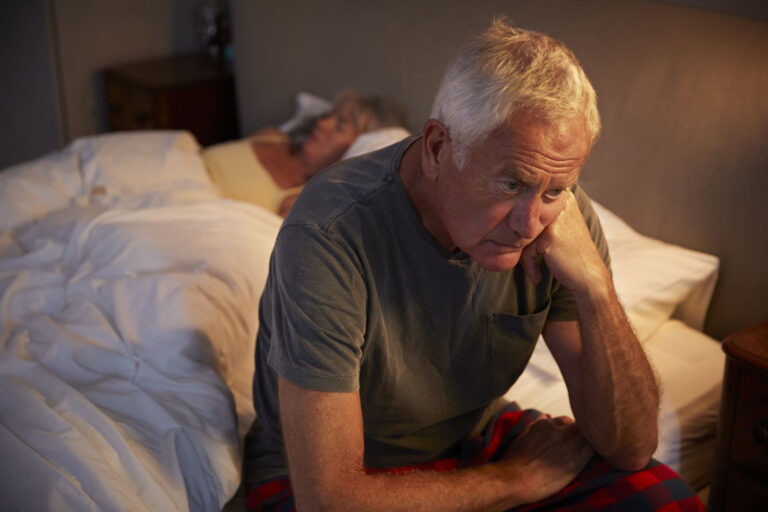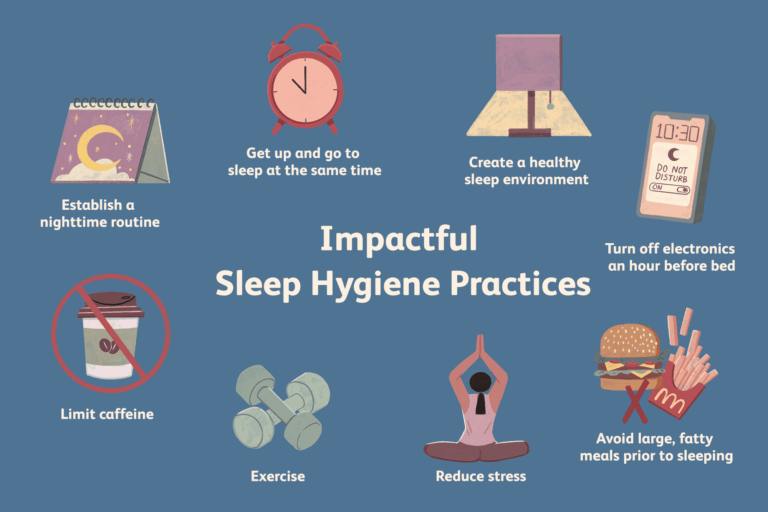SLEEP DEPRIVATION
You may have often heard from health care professionals that 7 – 9 hours of sleep is necessary. Ever wondered why? Sleeping is an essential requirement of your body. Sleep is an integral part of healing the body and the mind. Proper sleep protects you from potential diseases and helps the body remain healthy. Inadequate sleep impacts brain function, especially concentrating, thinking, and processing memories. The daily activity, stress, environment, change of place, and many more factors affect sleep.

SLEEP CYCLE
The sleep cycle is mainly divided into 2 broad stages.
- Non-REM (Rapid Eye Movement) – This stage is the first transition to sleep, also called slow-wave sleep or deep sleep. This phase helps the body repair itself with the release of hormones like growth hormone, stimulating tissue growth and muscle repair.
- REM Sleep – This stage mainly helps the brain to relax and repair. This is the phase where the brain is active and we tend to dream in this phase. This is not a continuous phase but happens in short intervals about 3-5 times during sleep.
-
- Sleep deprivation will lead to fatigue, weakened immune system, and impaired brain function which causes risk of viral infections, diabetes, increase in blood pressure, mental illness, heart ailments as well as weight gain as metabolism is reduced. Body temperature rises during sleep with increased heart rate which helps in increasing the metabolism which causes weight loss.
-
EFFECT OF SLEEP DEFICIENCY
Less sleep can make people dull and if this is continued for a long time it can lead to diseases. It can lead to a reduced immune system, susceptibility to viral infections, effect on blood pressure as well as diabetes, stress, fatigue, etc. Some sleep-related disorders are:
- Insomnia: It is clinically defined as difficulty in falling or staying asleep. The most common reason for insomnia is stress, medication side effect, caffeine, etc. This can be treated by reducing stress through calming exercise, reducing caffeine intake, regular exercise, changing the environment of sleep, etc.

- Sleep Apnea: This is a medical condition that is caused due to obstruction occurring while breathing during sleep which disrupts sleep. Apnea occurs when the intake of oxygen is blocked due to the relaxation of muscles around the patient’s airway during sleep. This causes a drop in the level of oxygen in the body. Hence, to get proper oxygen the patient’s sleep is broken which causes disturbed sleep. This occurs majorly due to obesity, old age, or snoring. Reducing weight is the best way to get rid of the problem.
- Restless Leg Syndrome: This is characterized by the urge to move legs due to unpleasant feelings in the legs. The unpleasant feeling is often described as aching, tingling, or something crawling on the legs. This can be solved through medication prescribed by the doctor, iron supplements, reducing stress, and sleeping at the right time.
- Sleepwalking or Somnambulism: Sleep deprivations induce a behavior among some people to get up during the night and walk or do other activities without even knowing.
Scientists continue to research more on the impact of sleep on health and monitoring sleep to help people. But as observed in many cases, regulating sleep helps people in multiple ways. Hence, sleep for at least 7-9 hours for better health.
Sleep also has an adverse effect on physical health, such as:
- Obesity: During sleep, your body produces and regulates various hormones including ghrelin (feel hungry) and leptin (feel full). Lack of sleep can cause ghrelin to increase and leptin to decrease causing you to feel excessively hungry and overeat.
- Heart Problems: During sleep the blood pressure reduces and sleep deprivation will hinder your body to maintain proper blood pressure. This can result in coronary artery calcification, which is a predictor of coronary heart disease.
- Insulin Management: Sleep deprivation might affect your body’s response to insulin causing your glucose level to rise. The high level of glucose puts you at higher risk for developing Type 2 diabetes. Likewise, reduced sleep or poor sleep quality may adversely affect glucose control in known diabetics.
- Immune Health: Not getting sufficient sleep can influence how the immune system caters the infections and different diseases. Long haul decrease in sleep can likewise prompt persistent low-level inflammation all through the body, which underlies numerous constant ailments.
TIPS FOR BETTER SLEEP
If you get too little sleep even for just one night you might experience several unpleasant cognitive effects, including:
- Irritability.
- Daytime sleepiness.
- Slowed reaction time.
- Reduced focus and concentration
- Problems with memory and attention.
- Symptoms of anxiety and depression.

Sometimes we cannot control the factors which cause disturbance in our sleep however small lifestyle changes will help us improve the quality of sleep along with rejuvenating our bodies.
- Sleep Schedule – We need to maintain a schedule for sleep that includes no more than 8 hours of sleep as the average adult needs 7 hours of sleep. It is important to go to bed at the same time every day to maintain the sleep cycle. Sometimes we do not get sleep even after laying in bed for 20 mins, a small trick like getting out of bed and doing something relaxing will induce sleep like reading a book, relaxing exercise, breathing exercise, or soothing music.
- Food intake – Avoid heavy meals before sleep as well as does not go to bed empty stomach. Try to take your last meal at least 2 hours before you sleep. Avoid nicotine, caffeine as well as alcoholic content before sleep as they may disturb the sleep due to their stimulating effects.
- Environment to sleep – The room where you sleep should be dark, quiet, and cool. Some people often find it difficult to sleep in the light. Avoid screen time on your phone as well as a reading device like kindle before going to bed. Once you close your eyes to sleep, think of all the happy moments as it helps induce sleep. Calming activities like baths, listening to relaxing music, reading a book, etc. helps promote sleep.
- Avoid daytime naps – Naps in the daytime interfere in the time of your sleep at night. Sleeping at night is the best time to have a relaxed sleep. Napping during the daytime increases performance and alertness. If you require a nap in a day it should not be more than 30 mins. If you have a night shift then you can always try yoga Nidra for better sleep in the daytime.
- Less stress – Before going to bed it is necessary to be away from any worries to avoid any stress. Try to resolve any worries or issues before bedtime. The best thought is to leave all the worries for the next day and have a peaceful sleep. Listen to stress relaxation music to stress at bay.
- Exercise – Regular exercise induces happy hormones which keep the mind and body healthy. This helps in good sleep.

OUTLOOK
On the off chance that you experience long-haul sleep deficiency, you ought to think about booking an appointment with your primary care physician. Doctors can give important bits of knowledge about sleep wellbeing and cleanliness and, if necessary, perform tests to assess a sleep issue.
Call us on (469) 545-9983 to book an appointment with our specialists.
